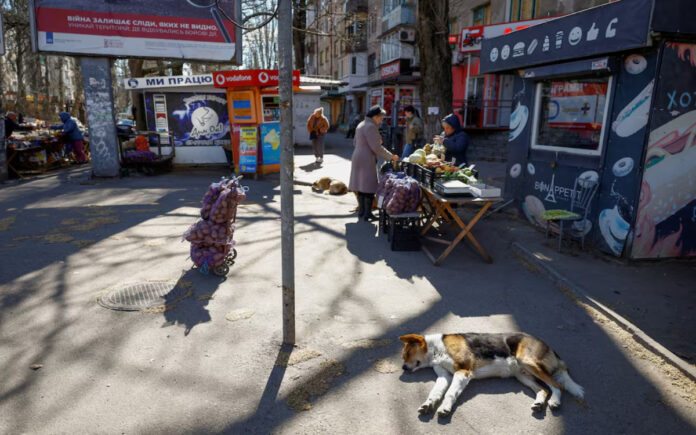Kherson: The frontline Ukrainian city of Kherson has endured years of conflict, making its residents among the most eager for an end to hostilities with Russia. However, the scars of occupation and relentless attacks since Russian forces were pushed back have left them skeptical of ongoing peace negotiations.
Serhiy, a 64-year-old security guard, lies in a hospital bed with a bandaged stump where his foot once was. He recounted being struck by a grenade dropped from a Russian-operated drone while on his way to work.
“There won’t be peace if they are on that bank of the river,” he said, refusing to disclose his full name or show his face for fear of retaliation by Russian forces. “It will be constant terror, constant shelling. We need to get them out of there, there’s no other way.”
As U.S. and Russian negotiators met in Saudi Arabia to discuss a proposed 30-day halt on attacks targeting each other’s energy infrastructure—a step toward a broader ceasefire—the people of Kherson remain under constant threat.
Life Under Siege
Once a bustling city of nearly 300,000 residents, Kherson’s population has dwindled to just 60,000. From March to November 2022, Russian forces occupied the city, during which residents reported widespread detentions and torture. The Russian military, which denies allegations of civilian abuse, was ultimately pushed out by a Ukrainian counteroffensive. Since then, it has relied on relentless bombardments from the other side of the Dnipro River.
As one of the largest settlements within range of Russian artillery and battlefield drones, Kherson has been labeled Ukraine’s most dangerous city. The use of drones to target civilians has intensified the crisis.
In his undisclosed hospital room—kept secret for security reasons—Serhiy recalled the moment he was attacked.
“I jumped towards a tree, but it tore off my foot, tore off everything,” he said.
Sharing the room with him is Ihor, a 30-year-old who was also wounded by a drone attack. He was searching for a phone signal—damaged cell towers had left the city with poor connectivity—when a grenade was dropped on him.
“I don’t want other people to be brought to the hospital like this,” he said, gesturing toward his leg, which was being held together by metal rods.
Ihor expressed hope that a political resolution would bring relief. “We believe that Trump will end the war this year, as he promised, and we will have peace,” he added, declining to share his last name.
The Ukrainian city of Kherson, continually targeted by Russian drone attacks, is seeking respite. The city, once home to 300,000 people, now has a population of 60,000 due to the relentless bombardments https://t.co/HDPaP839do pic.twitter.com/7mAnk2DxnW
— Reuters (@Reuters) March 24, 2025
Relentless Drone Attacks
According to Kherson regional governor Oleksandr Prokudin, the city endures between 600 and 700 drone attacks per week.
“They terrorize the population,” he said, accusing Russian drone operators of deliberately targeting civilians after spotting them through onboard cameras. Moscow has repeatedly denied intentionally attacking civilians.
The drone threat has changed daily life in Kherson. Maksym Dyak, a 38-year-old city bus driver, wears a flak jacket and helmet while at the wheel. His vehicle has been struck by drone-dropped grenades ten times, five of which occurred while he was driving.
“It’s very scary, especially when you have little children on the bus,” he said.
Also Read | U.S. to Enforce 25% Tariff on Countries Purchasing Venezuelan Oil
The hospital where Serhiy and Ihor are being treated has been attacked 21 times since November 2022, according to chief doctor Viktor Korolenko.
“You know, I really want all this to end … our doctors are burning out psychologically under the bombardment,” Korolenko said. He added that many hospital staff had been forced to live at the facility after their homes were destroyed, but he remained committed to staying in Kherson.
A City Holding On
Despite the dangers, many residents refuse to leave. At a central market last week, elderly shoppers browsed for vegetables and dried fish, even as warnings circulated about a drone flying in the area.
Tetiana Kudas, a 61-year-old cleaner shopping at the market, said the situation had worsened, especially as Russian President Vladimir Putin insists Kherson should be part of Russia in any peace settlement.
“They’re bombing us even more now,” she said, her voice trembling with emotion. Despite the risks, she refuses to leave her home. “I will stay on my land, and whatever will be will be.”



